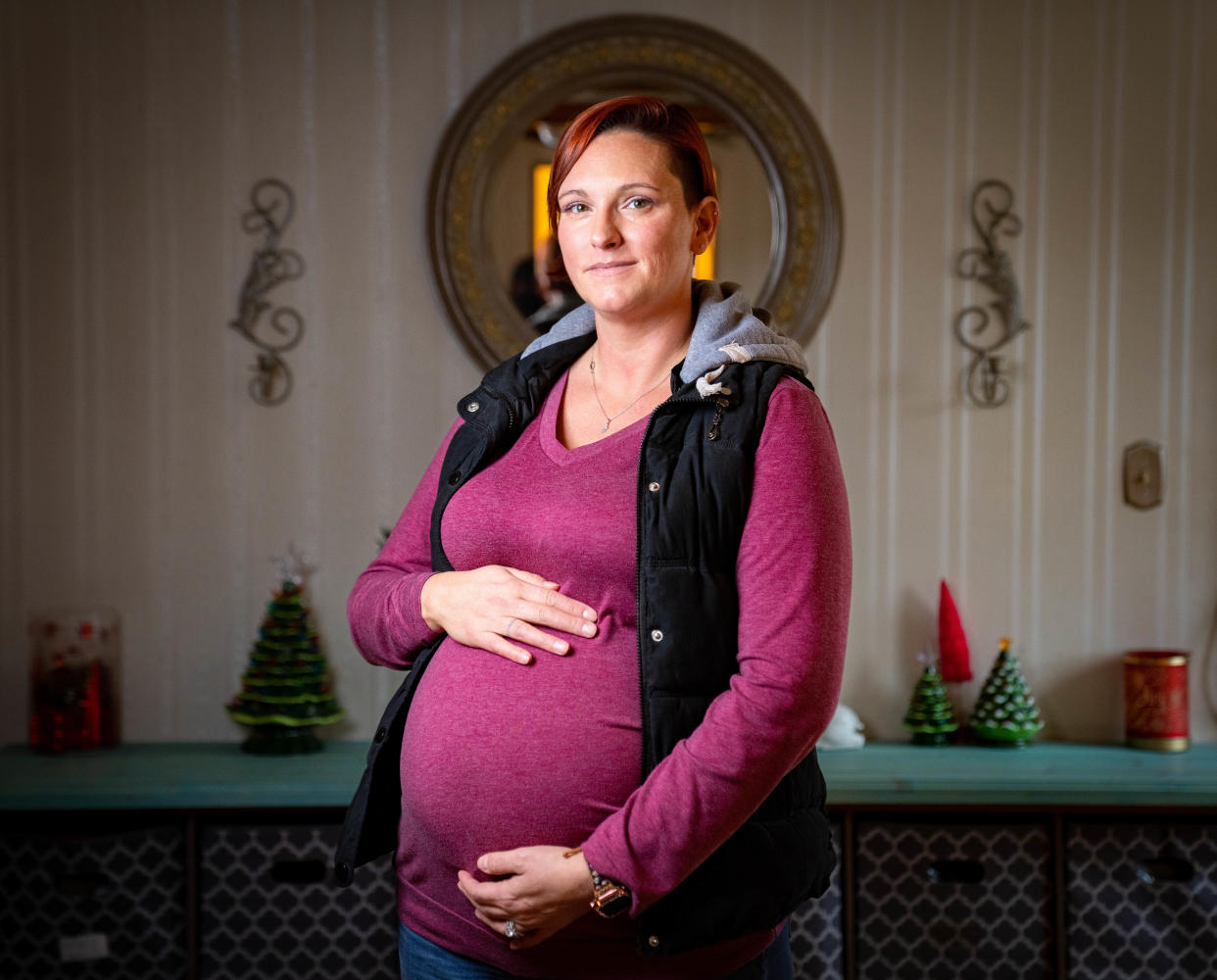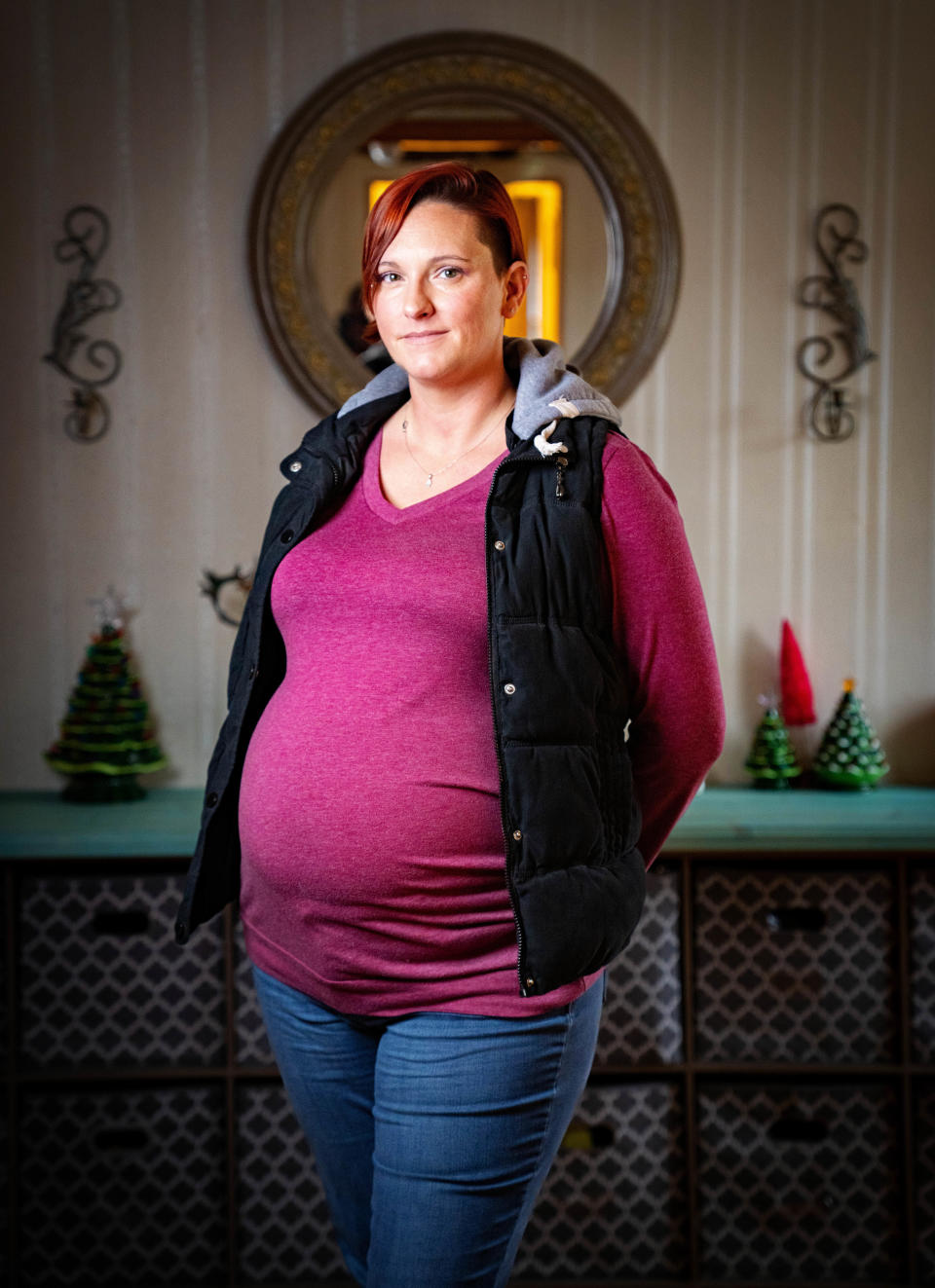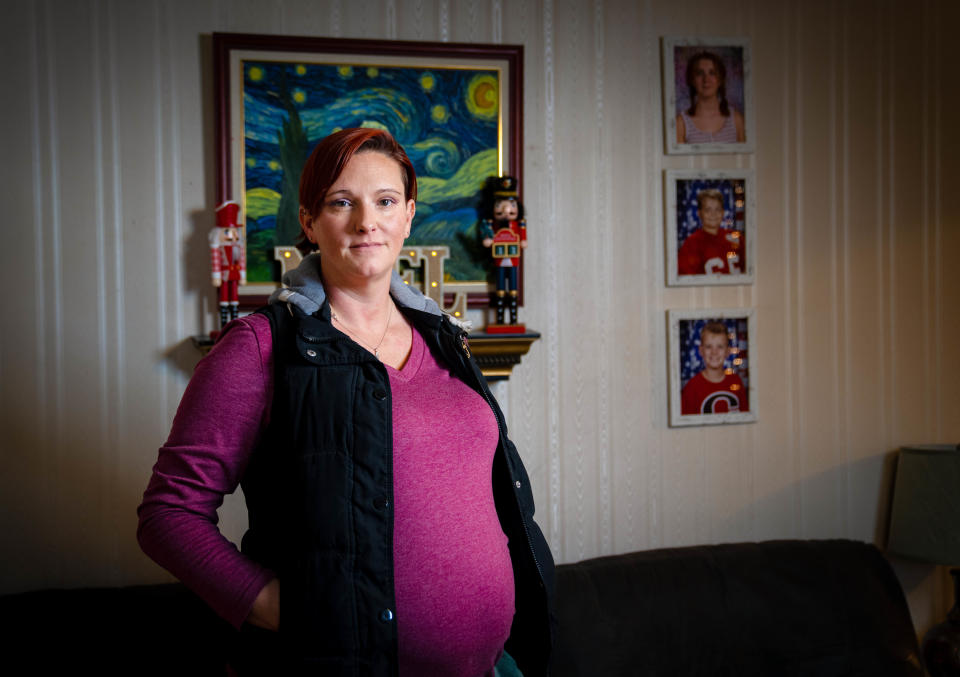Would you carry someone else's baby? Why this Iowa woman is doing it for the third time

- Oops!Something went wrong.Please try again later.
Ashley Greene's pregnancy isn't hers.
Her previous two pregnancies weren't hers either. The 38-year-old from Clinton is nearing the end of her third trimester, preparing to undergo childbirth for the third time for strangers.
Greene is a surrogate, someone who agrees to carry and deliver a baby for another person or couple.
Surrogacy has been popularized by the Kardashians and other celebrities, but commercially it remains an uncommon arrangement within the United States because of the significant costs and legal arrangements.
Only about 2% of pregnancies created through fertility treatments utilized gestational surrogacy in the U.S. between 1999 and 2013, according to the Centers for Disease Control and Prevention. Federal data shows 18,400 babies were born nationwide using gestational surrogacy during that time, with more than half of those infants part of twins, triplets or even higher multiples of siblings born at the same time.
Even more rare are women who chose to become surrogates. Only about 1-3% of women who begin the application process go through with a surrogate pregnancy, said Dr. Brian Levine, a New York-based fertility doctor and founder of a surrogacy start-up called Nodal.
An even smaller percentage go on to carry more than one surrogate pregnancy.

So what's Greene's motivation to undergo all the trials and difficulties of pregnancy and childbirth for strangers? She said she gets that question often.
Greene, who has three children of her own, says it's about helping others grow their own families. Watching parents meet their children for the first time in the delivery room solidified for her that this was her calling, she said.
"It's so easy for me to have babies, to get pregnant, to be pregnant. For so many people, that's not the way it is," Greene said.
That passion for helping others build their families ultimately led her to work in the surrogacy industry with a start-up called Nodal, which is working to build a platform to help potential surrogates match with families. There, she helps educate potential surrogates and connect them with hopeful parents.
"When I'm a surrogate, I can only help one family at a time," Greene said. "But when I work in the surrogacy industry, I can help multiple families at a time either start their family, build their family or finish their family. And so, for me, it was just a natural progression from being a surrogate to working in the industry.”
More:Four years later, the McCaughey septuplets' family home is still helping young moms
What is surrogacy?

As of last week, Greene was 36 weeks along with her third surrogacy pregnancy. The family she's carrying the child for declined an interview.
There are two types of surrogacy. The first is traditional surrogacy, in which a woman uses her own egg and is artificially inseminated.
The second is gestational surrogacy, where the surrogate carries a pregnancy created through a donor egg and donated sperm through in vitro fertilization (IVF). All three of Greene's surrogate pregnancies were gestational surrogate pregnancies.
Greene first came into contact with surrogacy in 2012, when she watched a close friend become a surrogate. The idea of surrogacy intrigued her, but she said it wasn't until 2018 that she returned to it.
By then, she and her husband were done having children, and she said they felt their family was in a good place to take on this endeavor.
Women looking to become surrogates must meet guidelines set out by agencies, such as age and health requirements, and pass medical and psychological evaluations. These women must also parent their own biological children and have the support of their immediate family to go through this process.
Greene applied to become a surrogate in April 2018, and a month later, she matched with a set of intended parents — a gay couple from Spain who had turned to surrogacy to have their own child.
Surrogacy arrangements are complex, and often take months of logistical legwork between both parties before surrogates can even begin the process of becoming pregnant. Greene underwent intensive medical screenings before finalizing contract negotiations with the intended parents.
Once those hurdles were cleared, Greene underwent a procedure to transfer two fertilized embryos in October 2018. Both were successful, and she later went on to give birth to two healthy baby girls.
"There’s not enough adjectives in the English language to properly describe seeing that joy, that relief, and that love in those parents' eyes when they see that baby that they never thought they were going to have," Greene said. "It's just awesome.”
Greene knew she wasn't done.
“Immediately after delivering the twins, I would say within three weeks, I knew I wanted to do it again," Greene said.
More:Inside America’s rural maternal health care crisis: Why are women of color most at risk?
High cost makes surrogacy hard to access for most families
Greene applied to be a surrogate for the second time in July 2019 and matched with another couple the following October. This time, it was with a heterosexual couple who had previously experienced loss in trying to build their family on their own.
The embryo transfer for her second surrogacy pregnancy took place in July 2020. She delivered a baby girl in March 2021.
Greene said carrying a surrogacy pregnancy comes with "a completely different mindset" than the pregnancies with her three children, who range in age from 8 to 12. There's no urge to prepare a nursery or to shop for baby clothes.
“I want to keep the baby safe, but at no point in time is it ever in my head that this is my baby," she said.
Most insurance plans do not cover the entire cost of surrogacy, meaning expenses from the pregnant surrogate's health care fall on the intended parents. Greene said surrogacy contracts in her pregnancies stipulate the intended parents are responsible for the cost of IVF treatments, as well as the associated costs from her medical care.
They also covered lost wages whenever Greene had to take time off work for doctor's appointments.
That's in addition to the base compensation surrogates receive. Greene said she received an average of about $44,000 base pay for each of her first two pregnancies.
For her third surrogacy pregnancy, which Greene is undergoing without the assistance of an agency, she said she is receiving somewhere in the range of $60,000 to $80,000. She declined to share a specific total.
To become surrogates, women must not benefit from any government aid programs, such as Medicaid or SNAP benefits or public housing. Greene said that requirement is to ensure they are financially stable enough to handle any unforeseen expenses and to ensure the process is not exploitative of the surrogate.
Levine said nationwide, the cost of surrogacy can reach as high as $250,000. Five years ago, the average cost was closer to $75,000.
The cost associated with surrogacy has made it unobtainable for most Americans, Levine said.
More:The best way to get a crying baby back to sleep? Researchers say they've figured it out
Roe reversal creates complications for surrogate pregnancies
Compensated surrogacy agreements are legal in the United States, but they are not federally regulated. As a result, the country has a patchwork of laws that vary state to state — and in some areas, even county by county, Levine said. New York, where Levine practices, legalized paid surrogacy last year.
Greene will give birth in Illinois, where surrogate laws are more friendly than Iowa's.
Gestational surrogacy is legal in Iowa, but the woman giving birth must be listed on the birth certificate as the legal mother. The intended parents must then undergo a process after the birth to terminate the gestational surrogate's rights and establish the correct parents' legal rights, according to Creative Family Connections, a surrogacy agency that tracks state laws.
The agency says only three states — Nebraska, Michigan and Louisiana — aren't friendly toward surrogacy. According to Creative Family Connections, these states either have laws that prohibit compensated surrogacy contracts or prohibit intended parents from being listed on the birth certificate.
The U.S. Supreme Court's decision to overturn Roe v. Wade, which ended the constitutional right to an abortion, has also created serious implications for surrogacy, Greene said.
Abortions are rare in surrogacy agreements, but in matching families with potential surrogates, where that surrogate lives has become critical. After several states enacted bans on the procedure, Greene said agencies have to consider whether it would be possible for the pregnant person to get an abortion should the pregnancy put their life at risk.

Following her second pregnancy, Greene was among the first staff hired at Nodal, the start-up founded by Levine that is building a platform to match potential surrogates with hopeful parents. As a program coordinator, one of her many roles in the company is approving applications for potential surrogates.
Since the Supreme Court's decision, Greene said she gets many questions about its potential ramifications from intended parents and from women who are considering becoming surrogates.
"There’s no clear answer there," she said. "What’s that threshold that says, 'mom’s going to die if we don’t perform this abortion.' Who gets to make that call?"
So far, Greene said Nodal hasn't turned away any potential surrogates or parents from states that have anti-abortion policies.
Surrogates still maintain autonomy over their body during their pregnancies, and intended parents can’t force the women to make medical decisions that make them uncomfortable. Surrogate contracts do, however, include certain stipulations for following the medical advice of doctors.
In addition, Greene said agencies work to match women with intended parents that share similar viewpoints on certain decisions that need to be made during pregnancy,
“For me, I don’t get the flu shot," she said. "I was honest with the parents that I would not get the flu shot while I’m pregnant, and if they weren’t OK with that, obviously I wouldn’t match with them."
Guidelines from the American Society of Reproductive Medicine state women should only carry a maximum of three surrogacy pregnancies.
However, Greene said she is still considering whether she'd like to become a surrogate for a fourth time.
"I love doing this, I know this is my calling," she said.
Michaela Ramm covers health care for the Des Moines Register. She can be reached at mramm@registermedia.com, at (319) 339-7354 or on Twitter at @Michaela_Ramm.
This article originally appeared on USA TODAY: Iowa woman carries her 3rd surrogate pregnancy for another family

